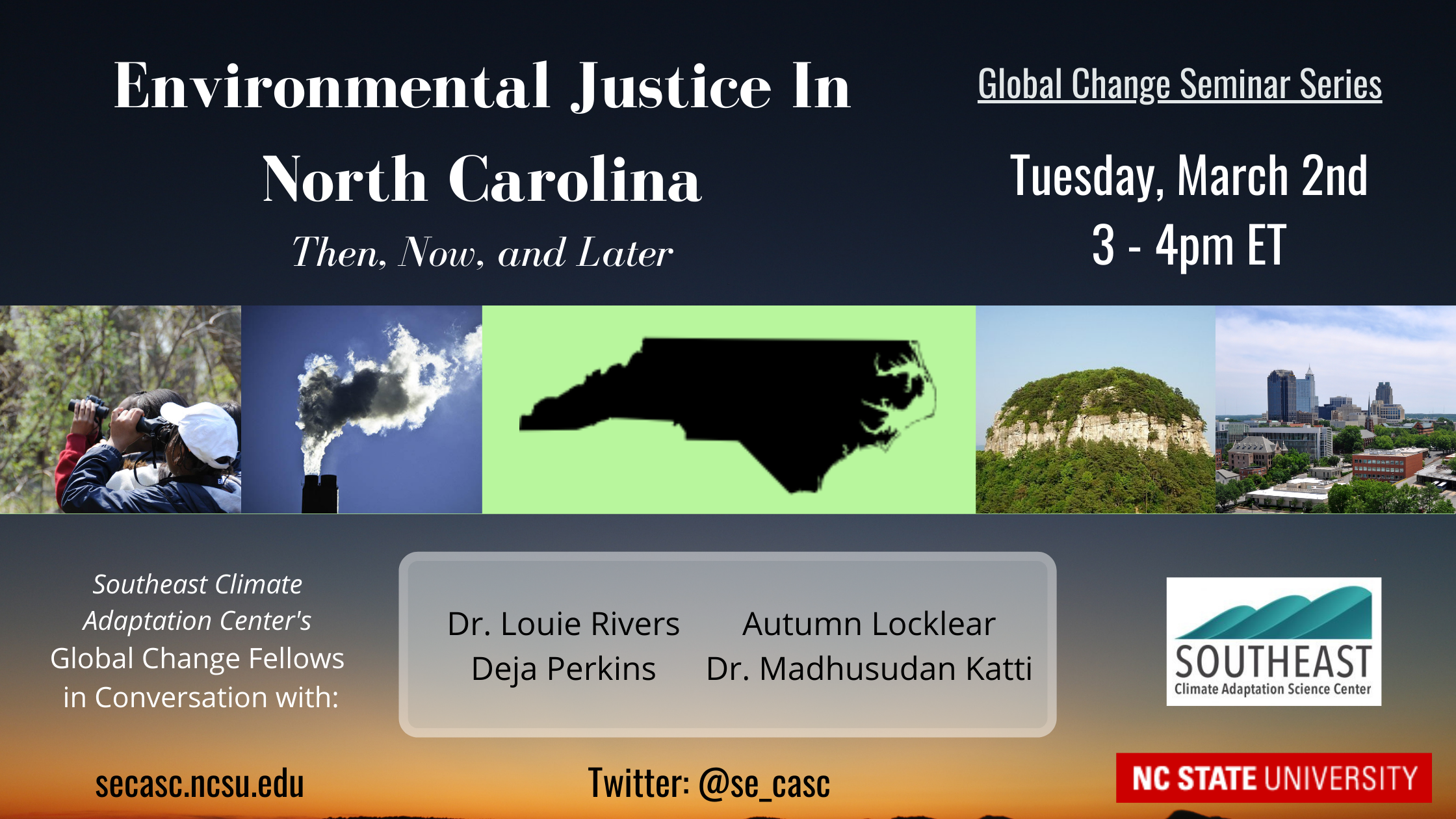Seminar Summary – Environmental Justice in North Carolina: Then, Now, and Later

The 2020-2021 SE CASC Global Change Fellows hosted their first seminar of the spring semester on March 2, 2021 as part of the Global Change Seminar Series. The topic, Environmental Justice in North Carolina: Then, Now, and Later, allowed for great insight and discussion by an outstanding panel that included Dr. Madhusudan Katti, Autumn Locklear, 2018-2019 Global Change Fellow Deja Perkins, and Dr. Louie Rivers III. Learn more about the seminar in the summary below, written by 2020-2021 Global Change Fellow, Kate Gorman. A recording of the seminar can be accessed here.
Speakers
Dr. Madhu Katti: Dr. Katti is an Associate Professor in the Chancellor’s Faculty Excellence Program for Leadership in Public Science and the Department of Forestry and Environmental Resources at North Carolina State University. His work centers around evolutionary psychology with a focus in urban areas. Through his work and own experience, Dr Katti has been actively engaged in challenging academic culture to become truly inclusive and equitable.
Autumn Locklear: Autumn is a climate health epidemiologist within the Occupational Environmental Epidemiology branch of the North Carolina Division of Public Health. She analyzes heat-related illnesses from syndromic surveillance data to produce summer heat reports for the NCDPH. She also collaborates with Community partners to develop heat health interventions in North Carolina.
Deja Perkins: Deja is an emerging expert on urban ecology and environmental justice. Her research focuses on the intersections of citizen science and socioecological systems, with emphasis on exploring how birds are influenced by anthropogenic drivers. An alumna of both Tuskegee university and North Carolina State University, she has expertise in citizen science, climate change, ornithology, and socioecological structures in urban environments. Deja was part of the 2018-2019 cohort of the SE CASC Global Change Fellows and she currently serves as the community engagement specialist and project coordinator for Crowd the Tap.
Dr. Louie Rivers III: Dr. Rivers is a professor at North Carolina State University. His research focuses on the examination of risk and judgment and decision processes in minority and underserved communities, particularly in regards to the natural environment.
Synopsis
The Global Change Fellows brought together an interdisciplinary panel to discuss Environmental Justice (EJ) issues in the state that kickstarted the EJ movement with the Warren County, North Carolina toxic landfill crisis in the 1980s. The discussion covered EJ issues that occurred in the past, are still problematic in the present, and require our attention to prevent injustice in the future.
Then
While discussing the environmental issues present in North Carolina in the past and how they affect us today, the speakers emphasized how multiethnic and multiracial engagement has always been a pillar of the EJ movement since the Warren County movement. Speakers emphasized the disproportionate access to healthy environmental conditions due to the legacy effects of inequitable policy decisions at both the local and federal level. For example, Autumn Locklear mentioned that, “A lot of low income communities and communities of color [live] closer to major roadways and therefore [they’re] more exposed to particulate matter.” The historical context of our modern infrastructure has had lasting effects on marginalized populations.
Now
Panelists emphasized the drastic changes that have created present EJ issues due to climate change and the COVID-19 pandemic. For example, sea level rise in NC not only presents threats for wildlife along the coastal areas, but for the people that live along the coast. Without addressing these problems that create sea level rise, there will be an even greater impact on often marginalized communities, whose homes are under greater threat due to climate change. During the initial COVID-19 shutdowns, there were significant decreases in carbon emissions. However there was little change in the consumer economy and we do not currently understand how these shifts in consumption impacted different parts of our infrastructure, such as the transportation sector, and if the associated environmental impacts are inequitably distributed. In addition, the presence of the “Anthropause,” a term used to describe the period of time directly after initial COVID-19 shutdowns around the world, led to many people seeing more wildlife in the city. However, there was a common misconception that these organisms were returning to the city, when in reality they were always there but unseen because of the presence of large numbers of people prior to the shutdowns. As Dr. Katti stated, “If we take a breath and stop what we’re doing, we might actually notice more birds in our backyard.” But the opportunities to interact with more natural spaces in this way is also not evenly distributed among a diverse set of human populations, which is an environmental injustice in and of itself.
Later
One of the most significant takeaways of the panel discussion dealing with future environmental justice issues was that the most important aspect of the EJ movement is the “J.” Dr. Rivers stated that “we can focus on environmental justice all we want, but the “justice” piece is the most important. Climate change has already affected us and is already affecting our children. At the end of the day, [we] have to make these hard moral decisions… That’s what it is about right now.”
Conclusion
The panelists offered valuable insights into how environmental justice is an important movement for the health and well-being of both natural and human systems. As Deja Perkins stated, “I think once we start to look at these issues side by side, and not just singular separate issues, we will start to be able to think about better solutions for the future.”
View the webinar recording
- Categories:
